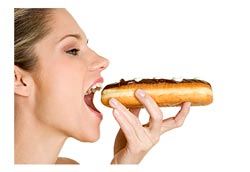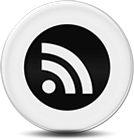How Do I Stop Overeating?
You want to stop overeating. Where do you start?

- Overeating can be mild or serious.
- Real binge eating can cause terrible problems.
- And there are lots of emotions tied up with weight loss and overeating.
- But the good news? It's not impossible.
Facing the problem
OK. Now, the first step in solving a problem is facing the problem. So it's time for you to take a good hard look at overeating.
Where do you start? For real results you start with the basics of weight loss.
And nothing is more basic than knowing what you are putting in your mouth. What are you eating, exactly?
- First, know exactly what you are eating.
- Then you can control it.
Read on to find out exactly what to do...
Waiting for a miracle
Look at it this way: What if it didn't take any work at all? What if you instantly knew everything there was to know about food?
Do you think that might help you stop overeating and lose weight somehow?
Well, unless a miracle occurs you are going to have to do it yourself.
But when you really understand weight loss -- when YOU become an expert on weight loss -- then you'll be able to stop overeating and lose weight and keep it off. And nobody and nothing will be able to stop you.
Why did I gain so much weight?
My patients come in -- they're overweight -- and they say, "I don't know why I gained so much weight. I don't eat that much."
So I ask them to write down what they eat. And you know what? They can't do it. Why? Is it too much work?
No. It's not the work. It's emotional.
It's too hard to face. It's an upsetting area.
But if you want to stop overeating and lose the weight you have to do it. You can't control what you don't know about. It's time to face the music.
Your choices
How are you going to get the right portions? Daily calories? Protein? Fat? Carbohydrate?
You need a plan that is going to work for you.
You have some choices. You can buy prepackaged food. You know, those diets you buy and just heat up. But really -- how long are you going to eat that way?
Or you can just guess. That's where you go, "I guess I'll just have a salad. That should help me lose weight. Right?"
But you've been guessing -- and look where that got you.
You could even just ignore the whole subject -- but if you do you'll never stop overeating and you're going to stay overweight your whole life.
Here's the really bad news!!!
To really know what you are eating you have to do some math. (Uggh! No!! Not MATH!!!)
Do NOT stop reading this page because you don't like math. This is very important for you!!
Yes, I understand that a lot of people have trouble with math. You might be afraid of math. It might be hard for you. Maybe your head will explode!
But they said it would be so easy!!
Now you say, "Well, what about all the books and articles and ads and websites that say that I don't need to do any of that. That I don't need to count calories to stop overeating. That all I need to do is blah, blah, blah…"
My answer to that is this: Really, are you happy with the way you look?
You've got to start somewhere to figure out what really needs to be done to stop overeating. You need a diet designed for you. One that works.
Otherwise it's just more failure and heartache for you.
The calculator is your best friend
You can't fool the laws of physics.
Call it calories. Call it portions. Use a number system. It doesn't matter.
Your body burns up a certain amount of food everyday.
It's about 1800-2500 calories per day. Maybe less. If you are active it's a little more. But it isn't 10,000 calories. It isn't 20,000. It's about 1800-2500.
And if you want to lose fat you have to burn it up somehow. That's physics. Sorry.
Fat calories
One of the easiest places to get tripped up is with the amount of fat in your diet.
Fat has so many calories -- over twice the number of calories of protein or carbohydrate -- that it's easy to get too many calories when you eat fatty food.
That's why you want good, lean, healthy, flavorful food that gives you more nutrition and fewer calories.
So let's use fat as an example.
How to find the percent
Just remember, to find percent of something you just put a "." in front of the number in the calculator.
For example to find 30% of something you put in .30 and then multiply.
To find 40% you put in .40.
If the percent is less than ten you have to put a "0" in front of the number. For example to find 5% you put in .05.
An example
How much fat do you want in your diet? You should get 25-35% of your calories from fat. And make sure it is good fat.
Let's say you are trying to get 25% of your calories every day from fat. How much is that?
To do it you take the number of calories you are going to eat in a day:
Daily calories = 2000
And you multiply by 0.25 (to find 25% you have to multiply by 0.25)
2000 x 0.25 = 500
Punch those numbers into your calculator and you get 500. That is the number of calories you want to get from fat each day. Not too hard, right?
Grams of fat
Recipes and labels list grams of fat. So how many grams of fat should you be eating?
You want 500 calories of fat everyday. There are 9 calories in a gram of fat.
So divide 500 by 9 and get the number of grams of fat.
500 / 9 = 55
So you eat 55 grams of fat every day.
Protein and carbohydrate
Do the same for protein and carbohydrate.
Protein should be 30-35% of your daily calories.
Carbohydrate should be 40-45% of your daily calories.
Protein and carbohydrate each have 4 calories per gram.
This is an important part of weight loss nutrition. And when you really get this and follow it the weight will come off.
Use the online calculator
There is also a free online calculator you can use to figure your daily protein, fat and carbohydrate.
First, use the daily calorie calculator or use the daily calorie calculator cm/kg to find how many calories you need each day.
Then take the number of calories you need each day and plug it into the protein, fat and carbohydrate calculator.
But, you really should read all the information here about how to figure it out yourself.
When you do you'll understand a lot more about food and nutrition. And it will be much easier for you to stop overeating and lose weight!
Read the label
Where do you get the information? Well, you can buy a book. There are lots of books that list the nutritional content of food.
You can find examples of recommended diets that list the nutritional content of the foods.
You can look it up on the internet. Or you can look on the label.
If you are in the US or Canada you are in luck. The food labels are pretty good at telling you what is in the food.
In Europe there has been a lot of controversy over food labels regarding what should be on the label and what language it should be printed in.
Overweight in Asia
In Asia various labels have been tested. Some have the traffic light system, with red, green and blue labels indicating levels of calories, fat, sugar and salt. Others labels list nutritional information.
But according to the Asian Food Information Center most people seem to be able to read the labels. And yet they still don't know how many calories they should be eating.
They're filling their mouths with all the foods that make you fat.
And from Bangkok to Seoul to Beijing people can't stop overeating and they're getting heavier all the time. It's a worldwide problem.
Well, it's tough all over. But it's time for it to get easier for you.
If the information is on the label you should use it.
Pork skins and weight loss
Let's take an example. You buy some fried pork skins. (Yes, there is such a thing. And yes, people eat them.) The label says:
Nutrition Facts - Pork Skins Sweet and Mild BBQ Flavor
Serving Size 10 Pieces (15g)
Servings per container About 4
Amounts per Serving % Daily Value
Calories 70
Calories from Fat 40
Total Fat 4.5g 7%
Saturated Fat 1.5g 8%
Cholesterol 20mg 7%
Sodium 430mg 18%
Total Carbohydrates less than 1g 0%
Dietary Fiber 0g 0%
Sugars 2g 0%
Protein 8g
Vitamin A 2%
Vitamin C 0%
Calcium 0%
Iron 0%
Now listen, it says "Servings per container About 4."
You know, and I know, that when you dig into a bag of pork skins (or potato chips or Oreos or whatever) it's not 4 servings. It's one serving!!!
Have you ever seen one of those cans of Coke that says "2 servings"? Who are they kidding? One can -- one serving!!! Right?
OK. So look at the fat. 40 calories. Now you multiply that x 4. (Because it's 4 servings.) 40 x 4 = 160.
Now, remember you wanted 500 calories of fat per day in your diet. So you now have 160.
That leaves 340 more calories of fat that you can eat today. (500 - 160 = 340)
Now that wasn't too hard, was it?
Make yourself a list
Do this for all the foods you eat regularly. Make a little list. Add it up.
Make sure you are following the new nutritional pyramid.
At the end of the day, what do you have? Is it about 500 calories of fat? Is it about 55 grams of fat? Well, good for you.
What if it is a little under, say 400 calories from fat? Well, then you probably want to get a few more good fats in your diet.
How about if it is over, say 600, 700, 800 calories from fat, or more? Then you have some decisions to make. It's really up to you if you lose weight or not.
Do I have to do this?
No, you don't. But look, do you like the way you look? Do you feel good about yourself? Do you want to stop overeating and feeling miserable?
Are you making progress toward having the body you want?
Have you been able to take weight off? And keep it off? No, you haven't.
It's a little work (No -- not the "W" word!!) But the payoff? You'll get 10 times as much out of it as you put into it.
So know what you eat. It can help you stop overeating. And you'll be on your way to having the body you want!
Popular articles:
With weight loss, knowledge is power...
If you know these few truths on this page -- and if you apply them consistently in your life...
If you can't stay on it forever and be fit and healthy and strong -- then it's an extreme diet.
Here's the easy way to ruin any slightest chance you have of losing weight...
Can you eat in restaurants and still respect yourself in the morning?
Calorie density is the difference between vegetable soup and a bagel.
Hidden calories that ruin your waistline...
Will it really help to drink water to lose weight?


